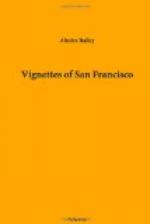The most interesting thing in Chinatown are the Chinese. To some they all look alike, but to me they seem very human and individual and folksy. I find myself paraphrasing: “But for the grace of God there goes John Bradford,” and when I meet a crafty looking old Chinaman this whimsy comes to me, “If Deacon Bushnell who passed the plate in the Centerville Methodist Church had been a Chinaman this is the way he would have looked.” They are such small town folks. Even with the steady cycle of tourists they gaze at each newcomer as though he were the latest comer to Podunk. One day with a friend I called on a Chinese girl, and all the large family and their friends gathered around and discussed us and laughed among themselves and pointed at us. It was embarrassing but I was never once conscious of rudeness, simply a childlike curiosity and honesty.
In Chinatown the other day a peddler was selling spectacles and somehow the old men trying them on and squinting for “near” and for “far,” seemed so quaint and countrified and like a lot of old Yankees around a country store trying to get a “new pair of eyes, by Heck.” In Chinatown the tong men do not seem at all real and the hair raising movie serial with its Chinatown terrors, Buddhist idols that open and swallow the movie actors and floors that drop into dungeons, seem very remote.
Bags or Sacks
“Do you like cafeterias?” I asked.
“Don’t know,” he answered, “I’ve never played them.”
“What religion do you follow?” another man asked me.
In a mining camp they told me to take such and such a “trail.”
The point is, that we did not talk that way where I came from. Of course, I hasten to say, we doubtless talked some other way just as peculiar. And if I could detect our colloquialisms I would write a lot about them but alas I can’t. I was in the West two years before I noticed that a “trolley” is a “street car.”
A woman in a mining camp said to the stage driver, “I want out at the bank because I don’t want to pack this sack of silver.” In the first place we wouldn’t have had a sack of silver and if we had, it would have been in a “bag” not a “sack,” and we never “pack” things and we never “want out.”
In the East we never refer to our locality as “this country,” as in the West and South. We do not take the name of our state either as “Californian” or “Kentuckian.” One never hears of a “Connecticutian” or a “Massachusettisian.” I do not profess to give any reasons for these peculiarities.
In the West, speech is more brief. “Autos go slow” is the warning while on the Fenway in Boston the signs read — “Motor Vehicles, Proceed Slowly.” I wouldn’t swear to the comma but the words are identical.
There is a small to near Provincetown where a sign reads — “Friends, we wish to think well of you and we wish you to think well of us. Kindly observe the ten mile motor limit.” After that the roads are so bad that one couldn’t possibly exceed ten miles if he tried. Probably the longest sign in California is that one which reads — “Drive your fool heads off.”




